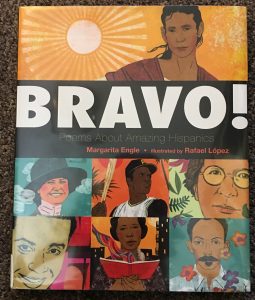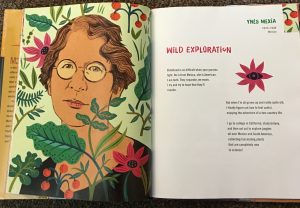Title: Bravo!: Poems About Amazing Hispanics
Author(s): Margarita Engle
Illustrator/Photographer: Rafael Lopez
Publisher and Year: Henry Holt and Company 2017
Number of pages: 38
Tags/Themes: Allison Henry, Culture, Diversity, Poetry, Picture Book, K-5, Non-fiction, Social Science
Genre: Biography
Descriptive Annotation: Bravo! is a biographical story that highlights many influential Hispanics (this is the term the author uses; however, the story does include individuals from countries other than Spain. A better term would be Spanish-speakers). The individuals in the text range from poets to doctors, musicians to astronauts, pilots to cowboys. At the end of the story is a list of many more influential Spanish-speaking people and a more descriptive paragraph about each of the individuals featured. Most of the words in the story are easy words, any students reading this would benefit from a general knowledge of history, although it is not strictly necessary. This story is written in free-verse poetry and the illustrations are done in pen, ink, watercolor, construction paper, and acrylic on wood.
Classroom Application: This text can be used to talk about social science and Spanish-speaking individuals’ contributions to many different fields. Many of the stories mention wars, slavery, injustice, and immigration. The stories of specific individuals can be used to supplement lessons and/or units on events such as the American Revolution, Civil Wars, music, medical advancements, and even minorities in baseball. This book could be introduced by asking students what they know about Spanish-speaking individuals’ contributions to history and then building off of their answers.
Linguistic and Cultural Diversity Analysis: This book can be used to highlight important people in the different Spanish-speaking cultures. A variety of cultures are represented in the book, so this text can be used when talking about many different cultures. On the page highlighting Julia De Burgos, it says, “I struggled to become a teacher and a poet, so I could use words to fight for equal rights for women, and work toward meeting the needs of poor children, and speak of independence for Puerto Rico.” Another page highlights Arnold Rojas, a cowboy, and says, “My Mexican ancestors included Yaqui and Maya indios, people who fought to stay free and live in their own traditional ways.” These quotes show just two of the many cultures represented in the text.


